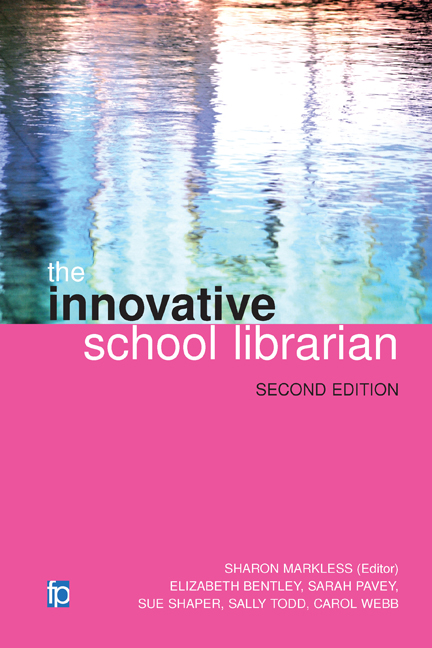Book contents
- Frontmatter
- Contents
- Preface
- Acknowledgements
- PART 1 WHO IS THE LIBRARIAN?
- PART 2 YOUR COMMUNITY: FROM PERCEPTIONS TO PRACTICE
- PART 3 MOVING FORWARD
- Appendix 1 Levels of education
- Appendix 2 School library self-evaluation questions
- Appendix 3 An example of a completed self-evaluation summary sheet
- Appendix 4 SWOT analysis
- Appendix 5 Choosing priorities in development planning: sample grid
- Appendix 6 Example of a force field analysis: a tool for managing change
- Appendix 7 Managing change: process and principles
- References
- Index
Preface
Published online by Cambridge University Press: 08 June 2018
- Frontmatter
- Contents
- Preface
- Acknowledgements
- PART 1 WHO IS THE LIBRARIAN?
- PART 2 YOUR COMMUNITY: FROM PERCEPTIONS TO PRACTICE
- PART 3 MOVING FORWARD
- Appendix 1 Levels of education
- Appendix 2 School library self-evaluation questions
- Appendix 3 An example of a completed self-evaluation summary sheet
- Appendix 4 SWOT analysis
- Appendix 5 Choosing priorities in development planning: sample grid
- Appendix 6 Example of a force field analysis: a tool for managing change
- Appendix 7 Managing change: process and principles
- References
- Index
Summary
Katya received a visit by fellow librarians to see the new school library. She prepared for the visit by displaying information on all her most recent activities to demonstrate how the library contributed to assessment for learning, reader development, teaching of 16–18 year olds and staff training. Katya observed that her visitors wanted to look at her stock and her general displays and to discuss how she managed overdue books. Several times she drew their attention to the information that showcased her wider activities but the majority of her visitors remained focused on the room's resources and its management rather than moving to a discussion of teaching and learning.
Although the context of school librarianship has changed dramatically over the past seven years, we believe that the fundamental concerns introduced in this vignette, which opened the first edition of this book in 2009, remain the same. School librarians are still faced with difficult decisions about their roles, priorities and activities: the shape of their contribution to teaching and learning within their schools. Therefore in this second edition we still aim to prompt school librarians to stand back from their day-to-day activity and critically re-examine their values, philosophy and what defines their professional practice. We have maintained our focus on ways of thinking about the job of school librarian rather than on its operational responsibilities. However we do not underplay the changes that have occurred since 2009 and recognize the many different ways in which context affects what we do and what we are able to achieve. In response we discuss the challenges and opportunities accorded by such changes as burgeoning technologies and resource cuts, and offer new vignettes describing current situations.
We recognize that there are big differences between schools: different curricula, different patterns of governance and management; and different levels and types of resources, before we even get to the students and teachers. This inevitably leads to big differences between school libraries. However, through working internationally with colleagues from the USA, Australia, Sweden, Denmark, Lithuania and Portugal, we know that school librarians share many common concerns as well as a common vision of what we are trying to achieve.
- Type
- Chapter
- Information
- The Innovative School Librarian , pp. ix - xiiPublisher: FacetPrint publication year: 2016



